نظم امنیتی منطقه ای در دوران پساداعش و موقعیت عربستان سعودی و جمهوری اسلامی ایران
محورهای موضوعی : مجله پژوهش های سیاسی و بین المللی
فرزاد نویدی نیا
1
![]() ,
مهناز گودرزی
2
*
,
سید جواد امام جمعه زاده
3
,
مهناز گودرزی
2
*
,
سید جواد امام جمعه زاده
3
1 -
2 -
3 -
کلید واژه: ایران, عربستان سعودی, داعش, موازنه قوا, نظم وستفالیائی,
چکیده مقاله :
فرزاد نویدی نیا[1]- مهناز گودرزی[2]- سید جواد امام جمعه زاده[3] تاریخ دریافت: 13/8/1398- تاریخ پذیرش:3/11/1398 چکیده: خاورمیانه منطقه ای پرتنش است. وجود دولت های اتوکراتیک و دیکتاتوری های باثبات نسبی، دست کم ساختار امنیتی دولت- محور و مبتنی بر موازنۀ هراس را به منزله بخشی از ذات این منطقه برآن مسلط ساخته است. پیدایش تروریسم مذهبی، افراط گرایی، به ویژه رواج آن در قالب گروه های وابسته به القاعده و طالبان و در دورۀ کنونی داعش، به تدریج این نظم وستفالیایی دولت- محور را کم رنگ کرده است.در این مقاله ساختار نظم منطقه ای این بخش از جهان در دوران پساداعش و موقعیت عربستان سعودی و جمهوری اسلامی بررسی شده است. در پرتو رهیافت رئالیستی، مدعای اصلی این مقاله آن است که داعش الگوی موازنه قدرت را به الگوهای ناپایدار در چارچوب توازن وحشت تبدیل کرده است. از این رو دولت های منطقه در دوران پسا داعش برای تحکیم نظم امنیتی مطلوب خود روابط پرتنش تری را تجربه خواهند کرد. این مقاله به روش توصیفی و با شیوه کتابخانه ای به رشته تحریر درآمده است. [1]- دانشجوی دکتری، روابط بین الملل، دانشگاه آزاد اسلامی، واحد اصفهان(خوراسگان)،اصفهان، ایران farzad.navid@gmail.com -[2] استادیار و عضو هیئت علمی، گروه روابط بین الملل،دانشگاه آزاد اسلامی، واحد اصفهان(خوراسگان)،اصفهان، ایران: نویسنده مسئول m.goodarzi@khuisf.ac.i [3] - دانشیار و عضو هیئت علمی، گروه علوم سیاسی و روابط بین الملل، دانشگاه اصفهان، اصفهان، ایران javademam@gmail.com
farzad navidi nia[1] Mahnaz Goodarzi[2] Seyed Javad Emam Jomezzadeh[3] Abstract: The Middle East is a full of tension area. The existence of despotic governments and relatively stable dictatorships has at least been governed by a threat balanced, state-owned security structure as part of the essence of the region. The rise of religious terrorism, extremism, and in particular its spread to al-Qaeda and Taliban groups and in the current era of ISIS, has gradually diminished this state-owned Westphalian order. In this article, the structure of the regional order of this part of the world in the post-war period and the situation of Saudi Arabia and the Islamic Republic is examined. Given the realistic approach, the main claim of this article is that ISIS in the context of terror assimilation has transformed the pattern of balance of power into unstable patterns. Thus, in the post-war period, regional governments will experience close relations to strengthen their desired security order. This article is a library-based descriptive method. [1]- PhD Student of International Relations, Isfahan Branch, Islamic Azad University, Isfahan, Iran [2]- Assistant Professor, Department of International Relations, Isfahan Branch, Islamic Azad University, Isfahan, Iran:Corresponding Author [3]-Associate Professor, Department of Political Science and International Relations, University of Isfahan, Isfahan, Iran
_||_

